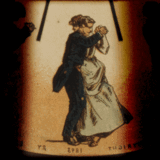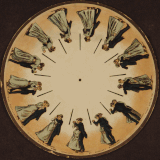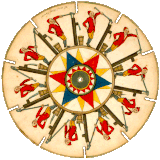Talk:Phenakistiscope
| This article is rated Start-class on Wikipedia's content assessment scale. It is of interest to the following WikiProjects: | |||||||||||||||||||||
| |||||||||||||||||||||
Functioning GIF
[edit]Yes, Muybridge disk is shown below, but it is not in motion. I feel there should be a correctly animated GIF here. Please go to talk if you want to discuss. --Janke | Talk 12:45, 24 June 2018 (UTC)
- I reverted your change again. According to WP:BRD, an editor can make a bold change (like you did), another editor can disagree and revert (like I did) and then we discuss. After the discussion we can modify the article according to the outcome of the discussion. I'm always open to discussion.
- There are a number of thing s I don't understand about your change. Firstly, how is the pumping GIG broken? It looks perfectly fine to me. The slightly off frame rate shows animation but also shows the rotation of the disc that produces it. Secondly, the Muybridge disc originally had both a static image and underneath it a close up of the animation in motion. The moving Muybridge disc that you added isn't quite as obvious as the pumping disc that the animation comes from the disc rotating. Stepho talk 22:48, 24 June 2018 (UTC)
It's not broken, it's faulty, just as the caption says. It should show the pumping man as being stationary, not rolling around the disk. Compare with the Myubridge disk, which shows a working animation. A still of the pumping disk would be OK, though. --Janke | Talk 09:34, 25 June 2018 (UTC)
- It is faulty. It's a 10 frame wheel, animated with 12 frames. I've reanimated it using 10 frames, and sped it up to 10 frames per second:
-
Man pumping water — corrected
This is how it would have looked. The whole image would not have rotated. The slits would have stayed in the same place as the images moved.
Actual picture?
[edit]Can we add an actual picture of the device and not just the animated wheels? I'm thinking something similar to this: http://bigvriotsquad.blogspot.com/2015/11/the-phenakistoscope-november-22-2015.html — Preceding unsigned comment added by Tocksin (talk • contribs) 11:59, 14 October 2019 (UTC)
- Sure. As long as you can find a copyright free image and put it on wikimedia. Stepho talk 20:57, 14 October 2019 (UTC)
- Well, the device mostly existed of a cardboard wheel. The rod and mirror that completed the most common setup aren't as interesting as the spinning disc, but an illustration of a person using this method was indeed something that could further illuminate the technique. I just added such a picture. You're very welcome to add an illustration of the device in your example, preferably next to the text about Variations. Joortje1 (talk) 21:37, 14 October 2019 (UTC)
Captions in gallery
[edit]I just restored the captions I added to the gallery. They were removed on the premise that images need no references. While this is a good point, the references were more for the year and the source. I put them there because the sources have more samples than just those in the gallery, and I wanted to give readers more access to them. Let's discuss before we decide how to proceed. —MiguelMunoz (talk) 23:13, 31 December 2019 (UTC)
- As said before, no need for references. However, captions for the year is a good idea. The original manufacturer would also be good. The sources for more images can be put in the 'External links' section, preferably linking to grouped pages rather than individual pages - this keeps it to just a few links instead of dozens.
- Note that all the previous references were meticulously detailed (I'll let you guess who spent hours doing that). Whereas the new references are bare URLs. Bare URLs are fragile because websites are often rearranged and then the URLs no longer work. By adding the extra details we give future editors enough clues to search for the new URL. Stepho talk 23:59, 31 December 2019 (UTC)
- Good point. I've removed the references, but kept the links. —MiguelMunoz (talk) 09:14, 1 January 2020 (UTC)
File:Animated phenakistiscope disc - Running rats Fantascope by Thomas Mann Baynes 1833.gif scheduled for POTD
[edit]Hello! This is to let editors know that the featured picture File:Animated phenakistiscope disc - Running rats Fantascope by Thomas Mann Baynes 1833.gif, which is used in this article, has been selected as the English Wikipedia's picture of the day (POTD) for February 23, 2021. A preview of the POTD is displayed below and can be edited at Template:POTD/2021-02-23. For the greater benefit of readers, any potential improvements or maintenance that could benefit the quality of this article should be done before its scheduled appearance on the Main Page. If you have any concerns, please place a message at Wikipedia talk:Picture of the day. Thank you! Cwmhiraeth (talk) 11:59, 2 February 2021 (UTC)

|
The phenakistiscope was the first widespread animation device that created a fluent illusion of motion. A series of pictures showing sequential phases of the animation are seen through small slots spaced evenly around the rim of a disc. The user would spin the disc and look through the moving slits at the images reflected in a mirror, seeing a rapid succession of images that appear to be a single moving picture. This animation shows one such phenakistiscope disc, entitled Running rats, created by Thomas Mann Baynes in 1833. Illustration credit: Thomas Mann Baynes; animated by Basile Morin
Recently featured:
|







